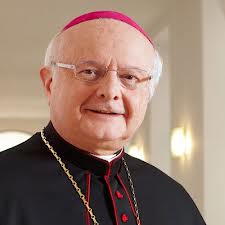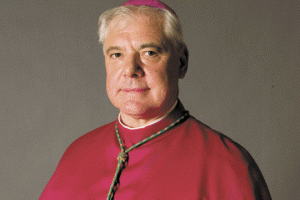 The former archbishop Freiburg im Breisgau Archbishop Robert Zollitsch, 75, tried to legislate a change in pastoral practice to allow remarried Catholics who have not received the required annulment from a previous marriage bond to receive Holy Communion. His resignation was accepted by the Holy Father on 17 September 2013. Archbishop Zollitsch, as the emeritus archbishop, has no authority to make such an allowance due to his canonical status but also because the proposal he was hoping to enact contradicted the theology of the Church.
The former archbishop Freiburg im Breisgau Archbishop Robert Zollitsch, 75, tried to legislate a change in pastoral practice to allow remarried Catholics who have not received the required annulment from a previous marriage bond to receive Holy Communion. His resignation was accepted by the Holy Father on 17 September 2013. Archbishop Zollitsch, as the emeritus archbishop, has no authority to make such an allowance due to his canonical status but also because the proposal he was hoping to enact contradicted the theology of the Church.
The several at the Holy See were clearly unhappy at Zollitsch’s bold (wreckless?) attempt to change a practice without thinking through the theology. Not that the happiness of the authorities Church is the goal of anything. Heaven is the goal and we get there by correct teaching, sacraments and compassionate leadership. The chief shepherd of a diocese, even he is the former shepherd, cannot on his own authority, make a change in theology. The transcentals (the beautiful, the good, the true and the one) can’t be ignored; neither can clear teaching based on Scripture.
Does something need to be done? Very likely. We do have a problem that needs sensitive guidance. But there we have to see to it that a few things are done: First, start giving good human, spiritual and catechetical formation to couples engaged to be married. Second, seek to walk with all married couples. Third, help to bring reconciliation to couples whose marriages are no longer sacramental. But Zollitsch created a chaos.
Recently, Archbishop Müller wrote an article outlining the Church’s teaching about marriage, divorce and the sacraments in L’Osservatore Romano.
Today, the Prefect of the Congregation for the Doctrine of the Faith wrote a letter to Archbishop Zollitsch, who now serves as the Apostolic Administrator of his former diocese. The following translation of Archbishop Müller is the work of Mark de Vries.
Archbishop Müller’s letter:
 With the Document Prot. N. 2922/13, of 8 October 2013, the Apostolic Nuncio has communicated the draft of the guidelines for the pastoral care of separated, divorced and civilly remarried people in the Archdiocese of Freiburg, as well as your newsletter to the members of the German Bishops’ Conference prior to the publication of this letter, to the Congregation for the Doctrine of the Faith. A careful reading of the draft text reveals that it does contain very correct and important pastoral teachings, but is unclear in its terminology and does not correspond with Church teaching in two points:
With the Document Prot. N. 2922/13, of 8 October 2013, the Apostolic Nuncio has communicated the draft of the guidelines for the pastoral care of separated, divorced and civilly remarried people in the Archdiocese of Freiburg, as well as your newsletter to the members of the German Bishops’ Conference prior to the publication of this letter, to the Congregation for the Doctrine of the Faith. A careful reading of the draft text reveals that it does contain very correct and important pastoral teachings, but is unclear in its terminology and does not correspond with Church teaching in two points:
“Remarried divorced people themselves stand in the way of their access to the Eucharist”
1. Regarding the reception of the sacraments by divorced and remarried faithful the proposal from the bishops of the Oberrhein area is recommended anew as a pastoral direction: after a process of discussion with the parish priests, people concerned can either reach the conclusion to participate much in the life of the Church, but to deliberately refrain from receiving the Sacraments, while others can in their concrete situations achieve a “responsibly reached decision of conscience” and be able to receive the Sacraments of Baptism, Holy Communion, Confirmation, Reconciliation and Anointing of the Sick, and this decision is “to be respected” by the priest and the community.
Contrary to this assumption the Magisterium of the Church emphasises that the pastors must recognise the various situations well and must invite the affected faithful to participation in the life of the Church, but also “reaffirms her practice, which is based upon Sacred Scripture, of not admitting to Eucharistic Communion divorced persons who have remarried” (cf. John Paul II, Apostolic Exhortation Familiaris Consortio, of 22 November 1981, N. 84; also compare the Letter of this Congregation of 14 September 1994 about the reception of Communion by remarried divorced faithful, which rejects the proposal from the Oberrhein bishops; and Benedict XVI, Apostolic Exhortation Sacramentum Caritatis of 22 February 2009, N. 29).
This position of the Magisterium is well-founded. Remarried divorcees stand in the way of their access to the Eucharist, insofar as their state of life is an objective contradiction to the relationship of love between Christ and the Church, which is made visible and present in the Eucharist (doctrinal reason). If these people were allowed to receive the Eucharist this would cause confusion among the faithful about the Church’s teaching about the indissolubility of marriage (pastoral reason).
2. In addition to this a prayer service is suggested for divorced faithful who enter into a new civil marriage. Although it is explicitly stated that this is not some “semi-marriage” and the ceremony should be simple. but it would still be a sort of “Rite” with an entrance, reading from the Word of God, blessing and giving of a candle, prayer and conclusion.
Such celebrations were expressly forbidden by John Paul II and Benedict XVI: “The respect due to the sacrament of Matrimony, to the couples themselves and their families, and also to the community of the faithful, forbids any pastor, for whatever reason or pretext even of a pastoral nature, to perform ceremonies of any kind for divorced people who remarry. Such ceremonies would give the impression of the celebration of a new sacramentally valid marriage, and would thus lead people into error concerning the indissolubility of a validly contracted marriage” (Familiaris Consortio, n. 84).
The affected faithful are to be offered support, but it must be avoided that “confusion arise among the faithful concerning the value of marriage” (Sacramentum Caritatis, N. 29).
Due to the aforementioned discrepancies, the draft text is to be withdrawn and revised, so that no pastoral directions are sanctioned which are in opposition to Church teaching. Because the tekst has raised questions not only in Germany, but in many parts of the world as well, and has led to uncertainties in a delicate pastoral issue, I felt obliged to inform Pope Francis about it.
“Going paths which fully agree with the doctrine of the faith of the Church”
After consultation with the Holy Father, an article from my hand was published in L’Osservatore Romano on 23 October 2013, which sumarises the binding teaching of the Church on these questions. This contribution was also published in the weekly edition of the Vatican newspaper.
Since a number of bishops have turned to me and a working group of the German Bishops’ Conference is dealing with the topic, I would like to inform you that I will send a copy of this letter to all the diocesan bishops of Germany. Hoping that on this delicate issue we are going pastoral paths, which are in full agreement with the doctrine of the faith of the Church, I remain with heartfelt greeting and blessings in the Lord.